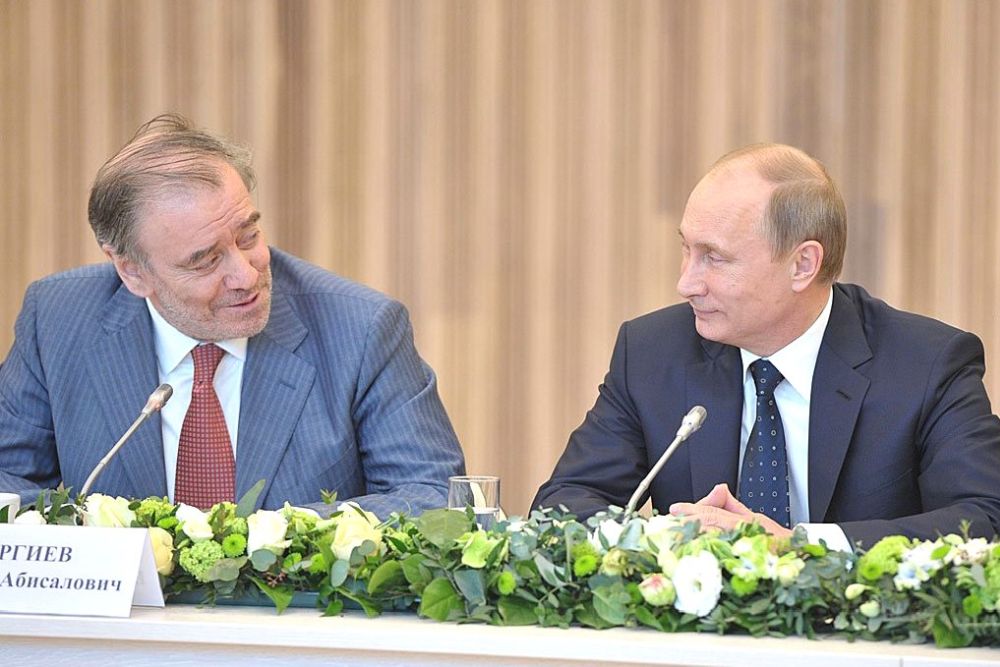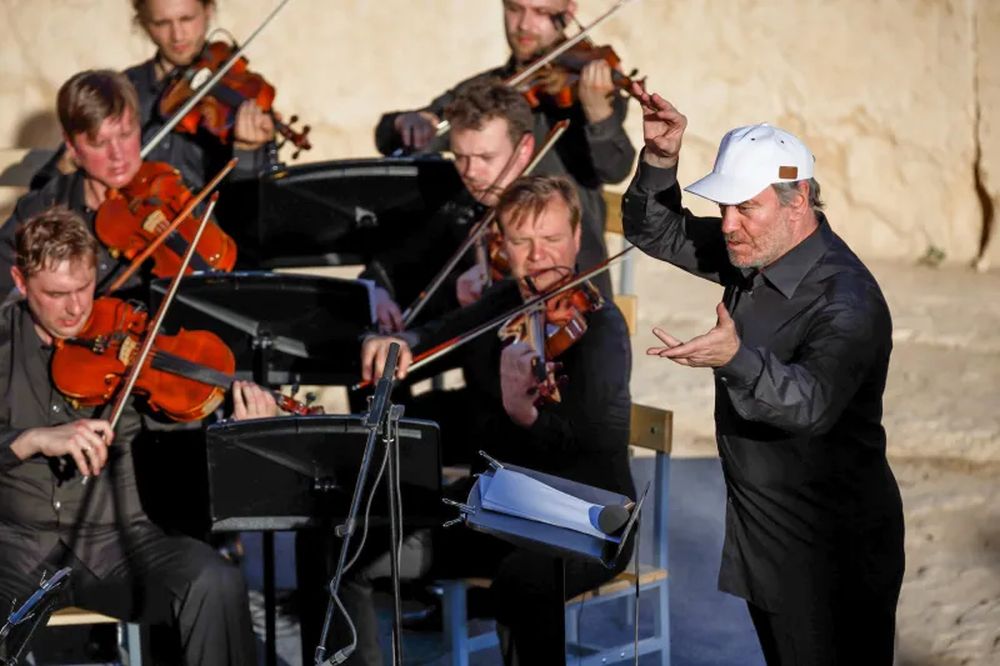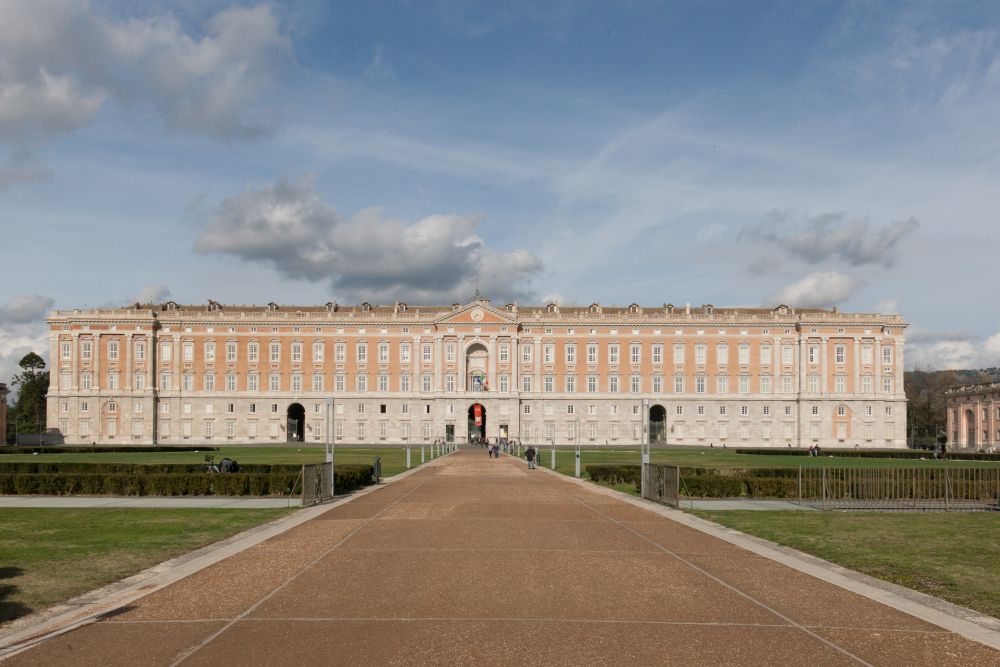Valery Gergiev
Is Italy crossing the red line?
Putin’s Maestro is about to return to the West with the support of the EU funds. How is this possible? And what does this mean for the future?
Katia Margolis • 08. Juli 2025

Valery Gergiev, the Russian conductor and longtime ally of Vladimir Putin, is scheduled to perform on July 27 at the Un’estate da Re festival in the Royal Palace of Caserta, Italy. Tickets are already on sale. This marks his loud and controversial return to the European stage after years of exclusion due to his loyal support for Russia’s war against Ukraine — and, astonishingly, with the help of public funding, including European Union cohesion funds, despite the fact that Gergiev has been sanctioned in several countries.
Unlike Germany, the UK, the Netherlands, and Scandinavian nations — where cultural institutions severed ties with most pro-Kremlin artists — Italy has chosen a more "tolerant" or "neutral" approach. Some even echo the favorite mantra of Russian propaganda: “Art is above politics.”
Here is a little reminder: In Germany he was fired by the Munich Philharmonic, in the UK he was removed from the Edinburgh Festival and other programming, in the USA his performances and tours were cancelled, in France he was banned from Théâtre des Champs-Élysées and other venues, and Canada included him in the list of individual sanctions. But in Italy, Gergiev is welcomed with open arms — all in the name of “cultural dialogue,” even as unbelievable war crimes continue in Ukraine. Gergiev has never hidden his loyalty to the Putin regime.
Spearhead of Russian propaganda
Taking into account that since the days of the Soviet Union the cultural sector, like sports, in Russia serves as an important tool for the national and international propaganda, Gergiev must be considered the most important cultural representative of the Putin system. Long before Russia's war against Ukraine began in 2014, the two alpha males were considered close confidants. When Gergiev, who has been the General Director of the Mariinsky Theater in St. Petersburg for almost three decades, clearly sided with Putin at the start of the Great Invasion, he was additionally appointed the General Director of the Bolshoi Theater in Moscow in 2023. This makes Gergiev the head of the two most important national cultural institutions in Russia. Both theaters already served as the spearhead of Russian cultural policy during the Soviet era. Their artists are raising money for weapons against Ukraine, and ballet dancers who express criticism are falling out of balconies and windows. [1]
Of course, Gergiev publicly praised the president, supported Russia’s "great revival," and in 2014, endorsed the annexation of Crimea. That same year, he led a concert in Moscow honoring Russia’s armed forces. After Russia’s full-scale invasion of Ukraine in 2022, cultural leaders around the world called for a boycott of Gergiev, accusing him of direct complicity in the Kremlin’s aggression. Major orchestras and opera houses in Europe and the US dropped him. Still, Gergiev stood firm, doubling down on his support for Putin — and, in return, received even more backing from the Kremlin.

His fondness for dictators and warlords predates Ukraine. In 2008, Gergiev conducted a concert in Tskhinvali, South Ossetia—a region of Georgia that was then, and now, under Russian military control – presented as a tribute to civilian victims (It is noteworthy at this point that Gergiev himself descends from an Ossetian family). In 2016, following the Russian and Syrian military seizure of Palmyra, Gergiev performed a highly publicized “liberation concert” among the ruins. Broadcast widely on Russian state TV, the concert served as cultural propaganda to legitimize Moscow’s role in Syria and reinforce Putin’s image as a “defender of civilization.”
And now, in July 2025, Gergiev is scheduled to perform in Campania — at a festival funded in part by the Italian government, the Campania regional administration, the Teatro Verdi in Salerno, and Italy’s Ministry of Culture. It is officially branded as a cultural initiative supported by EU Cohesion Funds (Fondi Coesione Italia 21/27).
More than “just” a super-rich artist
Let’s be clear: art is never apolitical — especially during a war. In fact, Gergiev is more than an artist. He is a person with a political function, serving a regime that is internationally accused of war crimes. His return to the European stage is not a neutral cultural gesture — it is a political act.
Add to this one more unsettling fact: Gergiev owns a real estate empire in Italy, reportedly worth more than €100 million. According to Russian opposition figures — including the late Alexei Navalny, who was killed in a Russian penal colony in 2024 — Gergiev inherited these properties from Countess Yoko Nagae Ceschina, a Japanese harpist and philanthropist, widow of Count Renzo Ceschina, a supplier to the Italian army in both world wars.
Her will names Gergiev as heir, granting him the Barbarigo Palace on Venice’s Grand Canal, the historic Caffè Quadri in Piazza San Marco, an 18-room villa in Olgiate, vast land holdings in Romagna, and a villa on the Sorrento Coast. [2] Recently, Italy’s famous Alajmo restaurant family renewed its rental agreement for Caffè Quadri — paying Gergiev €3.5 million over seven years. [3] This means a sanctioned Kremlin-aligned figure is directly profiting from Italy’s most prestigious public spaces.
Navalny's research team also claims to have discovered that Gergiev has Dutch citizenship (which in the Netherlands would actually be illegal for a Russian citizen). [4] In a response to a parliamentary question about this in 2022, Dutch Foreign Minister Wopke Hoekstra refused to confirm this information - but he did not deny the allegation either. [5]
Any attempt to "normalize" Gergiev’s presence makes this even more troubling. In 2022, La Scala dropped him from its programming after he refused to condemn the war in Ukraine. And now — after three years of genocide, missile strikes on residential buildings, torture and executions of prisoners, and mass atrocities documented by international bodies — this concert in Campania becomes part of a broader trend: the normalization of brutality through culture.
A signal of surrender

Yes, in peacetime, one might argue for “separating art and politics.” But in wartime — especially a war of conquest launched in 2014 and escalated into full invasion in 2022 — such neutrality becomes complicity. Allowing figures like Gergiev — whose regime is bombing cities, deporting children, and jailing dissidents — to perform on publicly funded stages is not just tone-deaf. It is an ethical failure.
This is not just about a concert. It’s about symbols. Theaters, festivals, and palaces are not just venues — they are arenas of meaning, and they can either uphold human dignity or launder authoritarian violence. Gergiev’s presence in Italy — funded by EU resources — is a shameful concession to soft-power propaganda of a terrorist state.
Inviting Gergiev to Campania — with European funds — is a dangerous appeasement of Russia’s cultural offensive, which seeks to blur the line between art and propaganda. As EU Parliament Vice President Pina Picierno rightly noted, publicly funding Putin’s allies is unacceptable. [6] It sends the wrong signal — a signal of surrender.
And indeed, Russian state media is already hailing the concert as Gergiev’s triumphant “return to Europe.” Once again, culture is weaponized. Since Soviet times, music, ballet, and the arts have been key tools of Kremlin messaging. The KGB had entire departments focused on shaping the regime’s image through culture. One goal of such propaganda efforts is to raise the national cohesion of Russian citizens. In this context, supporting Gergiev’s engagement in Europe means strengthening the Russian regime.
This is not about freedom of expression. It’s about responsibility. Art can either support humanism — or whitewash violence. When Gergiev conducts in war zones or imperial ruins, he’s not just waving a baton. He’s legitimizing state terror.
What message is Italy sending by supporting Ukraine politically, but welcoming Kremlin propagandists culturally?
Cultural sanctions — including visa denials and stage bans — are peaceful and necessary tools of resistance. Art is powerful. But with that power comes a moral obligation: not to legitimize those who crush freedom and destroy lives.
Those who claim “art is above politics” must ask: above whose politics? Above human rights? Democracy? Solidarity? That’s not neutrality — that’s convenient amorality. When sanctions are among the few peaceful forms of pressure we have left, any cultural compromise becomes a form of complicity. And in the end — as always — it is the innocent who pay the price.
Katia Margolis, born in Moscow in 1973, is a visual artist, writer, professor, and public intellectual. She lives and works in Venice (Italy)
Link to a German translation of this article
Sources
[1] Russian Ballet Dancer Dies From Balcony Fall in St. Petersburg, Kyiv Post, 2024-11-19 // https://www.kyivpost.com/post/42490
[2] Il tesoro «nascosto». La contessa che regalò Venezia a Gergiev, l’amico di Putin. – by Luciano Ferraro, Corriere della Sera, 2022-05-17 // https://www.corriere.it/sette/esteri/22_maggio_17/tesoro-nascosto-contessa-che-regalo-venezia-gergiev-l-amico-putin-7c457640-d13b-11ec-b465-8b7c23727ee0.shtml
[3] Alajamo, la famiglia di ristoratori resta al Caffè Quadri di Venezia: maxi affitto milionario al russo Gergiev, fedelissimo di Putin. – by Andrea Giacobino, Affaritaliani.it, 2025-05-21 // https://www.affaritaliani.it/economia/alajmo-caffe-quadri-venezia-gergiev-putin-mosca-ristorazione-970458.html
[4] Дирижёр путинской войны (The conductor of Putin's war) – Video with English subtitles by Alexei Nawalny, 2022-04-12 // https://www.youtube.com/watch?v=g9BOyC37JGU
[5] Valery Gergiev Does Not Qualify for European Sanctions. - by Francisco Salazar, operawire.com, 2022-06-22 // https://operawire.com/valery-gergiev-does-not-qualify-for-european-sanctions
[6] Picierno: «Gergiev è un ambasciatore della propaganda di Putin, De Luca non lo faccia esibire a Caserta». – by Cristina Liguori, Corriere del Mezzogiorno, 2025-07-06 // https://napoli.corriere.it/notizie/cronaca/25_luglio_06/picierno-gergiev-e-un-ambasciatore-della-propaganda-di-putin-de-luca-non-lo-faccia-esibire-6a9bc9df-1523-4143-b8dc-8d1e48bd7xlk.shtml
On the topic
OPERN·NEWS
In the service of evil. Anyone who criticizes Anna Netrebko must take a closer look at the no less celebrated bass Ildar Abdrazakov. For the directors of Europe's leading opera houses, it is time to finally take action. – by Stephan Burianek, 2023-06-19 // https://opern.news/news/beitrag/504
The balancing act continues. Anna Netrebko: To this day, one waits in vain for genuine words of regret from the famous Russian opera singer. Her attempt to walk a fine line is doomed to failure. – by Martin Kienzl, 2022-02-07 // https://opern.news/news/beitrag/484
Free press against ruZZian cultural policy. We have hit a nerve - and in order to continue, we need you! // https://opern.news/news/beitrag/502
OPERAWIRE
Report Released on Putin Supporter Valery Gergiev’s Numerous Properties & Illegal Activities. – by Francisco Salazar, operawire.com, 12.04.2022 // https://operawire.com/report-released-on-valery-gergievs-numerous-properties-illegal-activities/